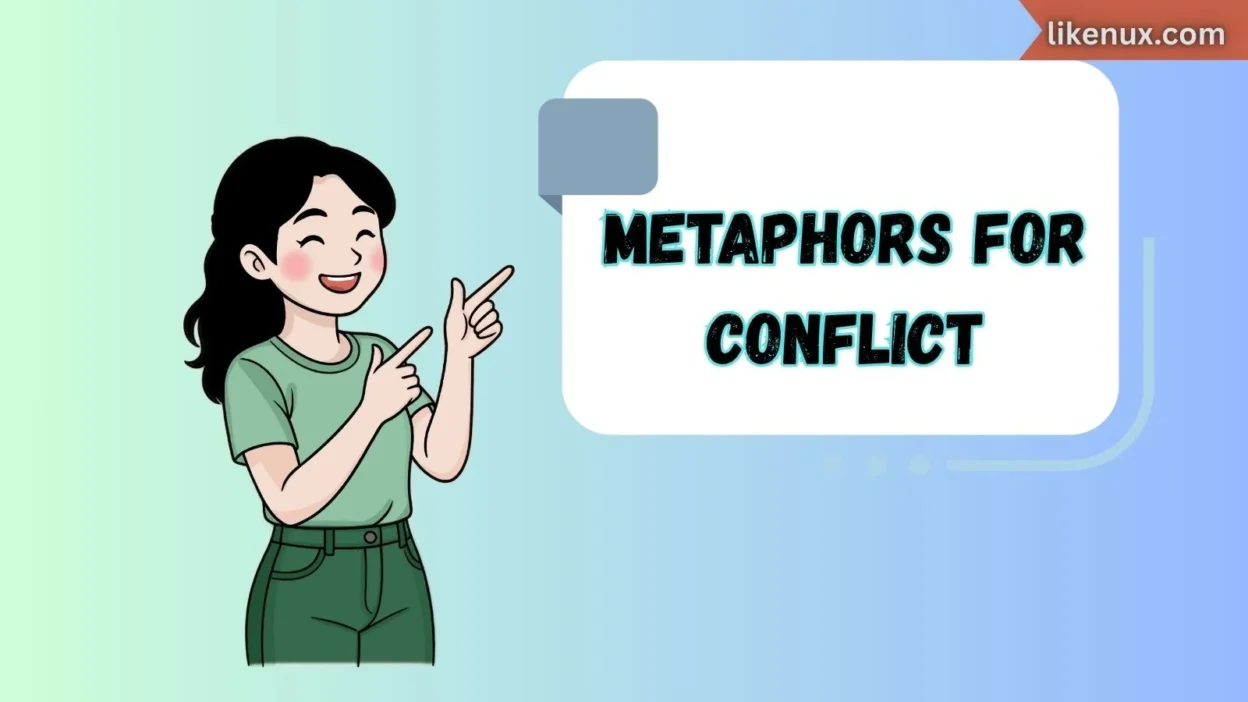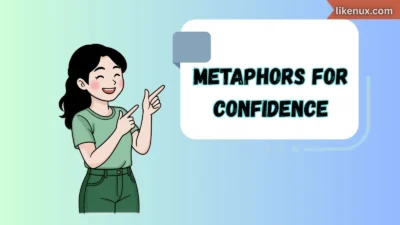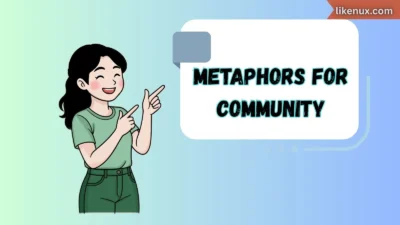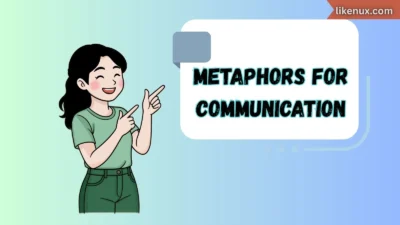Conflict is something we all experience—whether it’s a quiet disagreement with a friend or a heated debate at work. It’s part of being human. Yet, finding the right words to describe conflict can help us communicate with understanding, empathy, and care. Metaphors for Conflict are powerful tools.
They allow us to express complex emotions in ways that feel relatable and meaningful. In this article, we’ll explore 25 thoughtful metaphors for conflict—each crafted to help you speak or write about disagreements with warmth, emotional intelligence, and clarity.
I’ve personally found that using metaphors not only helps soften difficult conversations, but also deepens our ability to connect and reflect—both personally and professionally.
1. Conflict is a Storm
Meaning: A sudden disturbance filled with emotion and energy.
In a sentence: Their argument was like a storm—loud, intense, and unpredictable.
Best use: When describing emotionally charged disputes or sudden clashes.
Other ways to say: Turmoil, uproar, chaos.
2. Conflict is a Tug-of-War
Meaning: A struggle where both sides pull for control.
In a sentence: Their conversation felt like a tug-of-war over who was right.
Best use: For situations where both parties are stubborn or equally determined.
Other ways to say: Power struggle, standoff, clash of wills.
3. Conflict is a Fire
Meaning: A situation that can spread quickly if not managed carefully.
In a sentence: A small misunderstanding ignited a fire between them.
Best use: To describe escalating tensions or uncontained anger.
Other ways to say: Blaze, flare-up, heated exchange.
4. Conflict is a Dance
Meaning: A back-and-forth rhythm between opposing views.
In a sentence: Their debate became a delicate dance of ideas and emotions.
Best use: When emphasizing balance, rhythm, or mutual effort in disagreement.
Other ways to say: Exchange, dialogue, push and pull.
5. Conflict is a Battlefield
Meaning: A place of intense confrontation or competition.
In a sentence: The office felt like a battlefield during the budget meeting.
Best use: To describe professional or ideological disputes.
Other ways to say: War zone, confrontation, combat.
6. Conflict is an Earthquake
Meaning: A sudden shake that changes everything.
In a sentence: Their breakup was an emotional earthquake that left aftershocks for months.
Best use: For major, life-changing conflicts.
Other ways to say: Shock, rupture, upheaval.
7. Conflict is a Puzzle
Meaning: A challenge that requires patience to solve.
In a sentence: Finding the root of their conflict was like solving a complex puzzle.
Best use: When focusing on resolution or understanding.
Other ways to say: Problem, riddle, conundrum.
8. Conflict is a Cold War
Meaning: A silent tension that never fully explodes.
In a sentence: Their friendship turned into a cold war of quiet resentment.
Best use: For unresolved or passive-aggressive tensions.
Other ways to say: Silent feud, emotional distance, quiet hostility.
9. Conflict is a Wall
Meaning: Something that blocks understanding and connection.
In a sentence: Every argument built another brick in the wall between them.
Best use: To describe emotional distance or lack of communication.
Other ways to say: Barrier, divide, obstruction.
10. Conflict is a Wound
Meaning: An emotional hurt that takes time to heal.
In a sentence: Their harsh words left a wound that needed care and forgiveness.
Best use: For conflicts that cause deep emotional pain.
Other ways to say: Scar, hurt, injury.
11. Conflict is a Maze
Meaning: A confusing path full of dead ends.
In a sentence: They were lost in a maze of misunderstandings.
Best use: When expressing confusion or miscommunication.
Other ways to say: Labyrinth, confusion, entanglement.
12. Conflict is a Volcano
Meaning: Pressure building until it finally erupts.
In a sentence: Weeks of silence led to a volcanic explosion of emotions.
Best use: To show bottled-up emotions or delayed reactions.
Other ways to say: Eruption, blow-up, meltdown.
13. Conflict is a Chess Game
Meaning: A strategic struggle where every move matters.
In a sentence: Their debate felt like a chess game—careful, tense, and calculated.
Best use: For intellectual or political disagreements.
Other ways to say: Strategy, mind game, duel of wits.
14. Conflict is a Mirror
Meaning: It reflects our emotions and insecurities back at us.
In a sentence: Sometimes conflict is just a mirror showing us what we need to work on.
Best use: When focusing on personal growth through conflict.
Other ways to say: Reflection, feedback, revelation.
15. Conflict is a Test
Meaning: A challenge that reveals strength, patience, or character.
In a sentence: Their disagreement tested the strength of their friendship.
Best use: To show endurance or resilience.
Other ways to say: Challenge, trial, proving ground.
16. Conflict is a Knife
Meaning: It can cut deep if handled carelessly.
In a sentence: Her words were a knife that wounded more than she intended.
Best use: For emotionally sharp or painful exchanges.
Other ways to say: Sting, jab, emotional cut.
17. Conflict is a Shadow
Meaning: It follows relationships even when we try to ignore it.
In a sentence: The shadow of their old argument still lingered between them.
Best use: For unresolved or repressed issues.
Other ways to say: Lingering issue, ghost, remnant.
18. Conflict is a River
Meaning: It flows and can be redirected, but not stopped entirely.
In a sentence: Conflict is a river—you can’t block it, but you can guide its flow.
Best use: For healthy communication and emotional movement.
Other ways to say: Stream, current, flow of tension.
19. Conflict is a Firework
Meaning: It bursts with emotion, then quickly fades.
In a sentence: Their argument flared up like a firework—bright but brief.
Best use: For short, intense disagreements.
Other ways to say: Flash, flare, outburst.
20. Conflict is a Seed
Meaning: It can grow into understanding—or resentment.
In a sentence: Handled gently, that conflict became a seed for deeper trust.
Best use: When emphasizing growth through disagreement.
Other ways to say: Beginning, origin, catalyst.
21. Conflict is a Bridge
Meaning: It can connect people if crossed carefully.
In a sentence: That disagreement became a bridge to better understanding.
Best use: To show reconciliation or growth.
Other ways to say: Connection, path, link.
22. Conflict is a Mirror Maze
Meaning: A confusing reflection of everyone’s emotions and egos.
In a sentence: The argument turned into a mirror maze—no one saw things clearly.
Best use: For emotionally complex or circular arguments.
Other ways to say: Reflection trap, confusion, distortion.
23. Conflict is a Storm Cloud
Meaning: It looms and creates tension even before it bursts.
In a sentence: A storm cloud hung over the team after that decision.
Best use: To describe building tension before confrontation.
Other ways to say: Tension, unease, anticipation.
24. Conflict is a Knot
Meaning: It tangles emotions and requires patience to untie.
In a sentence: Their misunderstanding became a knot that took time to untangle.
Best use: For emotional or relational complexities.
Other ways to say: Tangle, complication, entrapment.
25. Conflict is a Journey
Meaning: It leads to growth and understanding if traveled mindfully.
In a sentence: Every conflict, when handled with care, becomes a journey toward maturity.
Best use: For reflective, growth-oriented discussions.
Other ways to say: Path, evolution, process.
Conclusion
Conflict doesn’t always have to be destructive. In fact, when seen through the right lens, it can be a path to growth, empathy, and better connection. These 25 metaphors for conflict offer not just creative ways to describe tension, but also gentle reminders that conflict is a natural part of human relationships.
By expressing conflict through metaphor, we soften its edges, deepen our emotional intelligence, and learn to communicate with both honesty and kindness.
FAQs
1. Why use metaphors for conflict?
Metaphors help simplify complex emotions and make difficult topics easier to discuss with empathy and clarity.
2. Are these metaphors suitable for professional writing?
Yes—many of these metaphors can be used in essays, leadership talks, or workplace communications to promote understanding.
3. How can metaphors improve communication?
They encourage reflection, emotional depth, and open-minded dialogue rather than defensive reactions.
4. Can conflict be positive?
Absolutely. When approached with respect, conflict can lead to growth, innovation, and stronger relationships.
5. What’s the best metaphor for healthy conflict?
“Conflict is a bridge” — because when crossed with care, it brings people closer.

Andrew Christopher is a passionate visionary who blends creativity with purpose to bring ideas to life. With a focus on innovation and integrity, he inspires growth and lasting impact.



